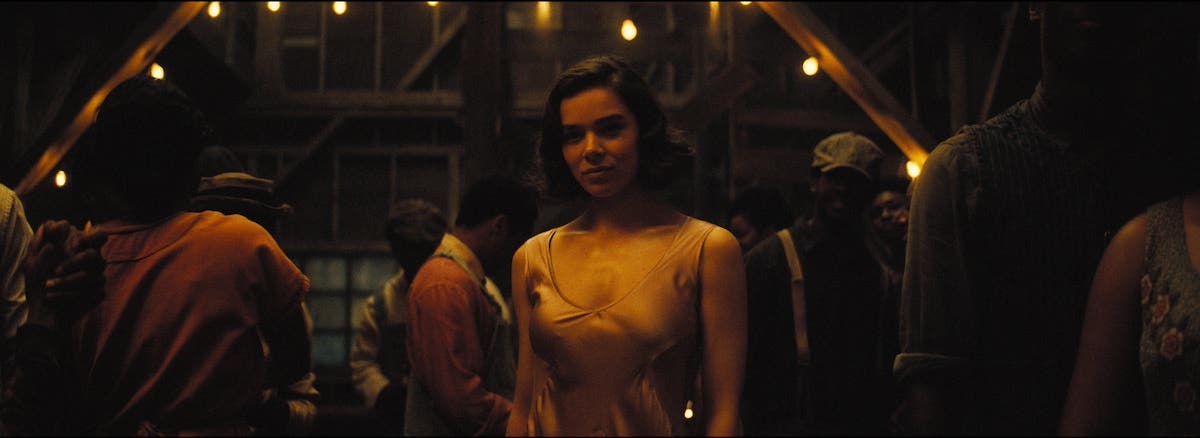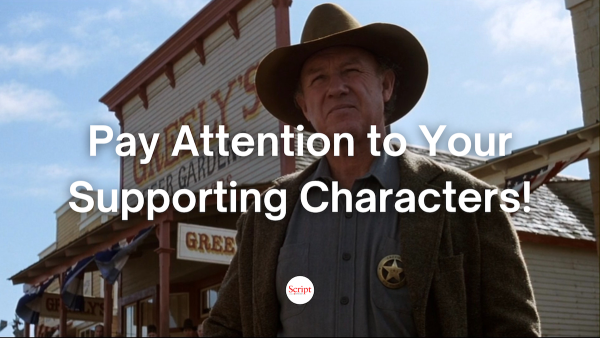BALLS OF STEEL™: Script Consultants – Are They Worth It?
Are script consultants worth the money? Jeanne Veillette Bowerman shares her opinion on consultants and insights into a professional screenwriter’s habits.
Jeanne Veillette Bowerman is the Editor of Script Magazine and a screenwriter, having written the narrative adaptation of the Pulitzer Prize-winning book, Slavery by Another Name, which was honored in the Top 25 Tracking Board Launch Pad Features Competition. Follow Jeanne on Twitter @jeannevb.
In my job, I come across all kinds of writers at varying stages in their careers. The up-and-coming ones often ask me to read their scripts, even offering to pay me. Unfortunately, with a full-time job, a family, and my own writing to do, I don’t have time to read everyone’s work, provide feedback, and offer the kind of detailed advice their stories need. So I do try to steer them toward a qualified script consultant.
#PIMPtipoftheday: Not everyone who is a screenwriter makes a good script consultant.
The market is flooded with “professional” consultants who have no business being one. Hence, the ones who are indeed qualified, end up getting a bad rap.
But let’s not get ahead of ourselves…
Are script consultants even necessary?
This is a topic that’s highly debated in the industry. Erik Bork, writer and producer of HBO’s Band of Brothers, recently wrote a great piece on his website, giving his own viewpoint. I highly recommend you read the full article, but here’s a snippet of Erik’s opinion:
I do agree that it is possible to “get there” on the cheap, with only a minimal amount spent on classes, books, etc. — and nothing at all for writers groups, bartering of feedback, and one’s own immersion in understanding the craft from produced scripts. I agree that screenwriting is, ultimately, free. And that success in it, in theory, can also be free. (And no “script consultant” should even hint at promising financial success, a sale, or a writing career. If they do, I agree that you should run away from them.)
But in my experience, for most aspiring writers who are really serious about moving forward, the really cheap or free resources don’t seem to be enough. And they don’t have access to free professional-level feedback on their work. But they seem to benefit the most from that — where someone who has done it (professionally written, produced, etc.) applies all they’ve learned to a writer’s work in a detailed, ongoing, one-on-one way.
If a writer can afford to purchase such a service, I believe it can be the most helpful and efficient thing they can do to move forward.
I ditto Erik’s thoughts.
I have used professional script consultants in the past, and I will again. Why? Because sometimes I need an opinion from someone who has experience developing screenplays and/or a fresh set of eyes. However, I typically do not use a consultant until I have hit a block or exhausted my personal network of readers. When under a tight deadline, however, I will absolutely use one if I need professional notes fast so I can finish a rewrite efficiently and meet my deadline.
Sometimes I simply need someone to tell me, STOP THE MADNESS… this baby is ready to go out into the world… or get your ass back in the seat; this is crap. My consultants give it to me straight, no sugarcoating and no bull. That’s how I roll.
Do professional screenwriters use script consultants?
While this would hardly qualify as scientific research, I asked a few produced screenwriters in my network and, at this stage of their career, none of them pay for feedback. They don’t need to. They have other professionals giving them script advice – agents, managers, producers, etc. (But let's remember, they do ultimately end up paying their agents and managers in commission... so I'd hardly say they're getting free advice.)
But a few did tell me prior to breaking in, they either had limited disposable income or no knowledge of which consultants existed (pre-Internet), therefore they predominantly got their script advice from their professors, fellow writers and/or agents. One reminded me production companies sometimes use consulting services if the producers have too many projects on their plates that are in need of assistance in the development process. There are only so many hours in the day.
Another form of “consultant” is the writer for hire. The heavy hands. The one who studios hire to rewrite a pro’s script without forking over writing credit, just a big fat check. Yep. There is a Justice League of Screenwriters who are anonymous, in the shadows and fixing scripts of professional writers, even award-winning ones. A different kind of consultant… one who, instead of giving advice, does the actual rewriting.
But studios and producers aren’t just using any script consultant who hangs up a shingle.
Which brings us to…
What makes a good script consultant?
Online, I’ve seen many people say they only want to learn from someone who has been a successful screenwriter themselves.
In the land of unicorns and leprechauns, that might just be possible. But guess what? Not all produced screenwriters make good consultants. Being a great consultant requires a degree of patience, hand holding, and tolerance to help elevate writing that is sometimes horrendous.
You also don’t have to be a produced writer to know what makes a good story. Many script consultants have read thousands of scripts. Not all writers have. The more you read, the more you learn how to be an effective storyteller.
Think about it. Those readers the studios use… the ones who decide the fate of your script. Did they have a screenwriting credit? Um, not so much. But they do know about the industry, what moviegoers’ expectations are, what their studio’s needs are, and what makes a solid story. Since they read an incredible volume of scripts each week, they know when a great story comes across their desk.
Having said that, if you can find a produced screenwriter who has the skill set to consult, even better. They've walked the walk and will hopefully give you the advice they wished someone had given them when they were starting out.
Here’s a quick list of qualities a great script consultant needs:
- Knowledge of the craft – structure, format, character development, etc.
- Knowledge of the industry – what’s commercial, what does an audience expect, what’s selling.
- Script development knowledge – how does a studio develop a script, what are the steps, how to give feedback that’s constructive.
- Testimonials and referrals – their site should either have testimonials or allow you access to prior clients for referrals.
- Does NOT promise they can get your script read by executives or get your work produced… and certainly does NOT have you pay extra for them to do that!
Now I need to speak more about that last point. Never in a million years would I EVER (yes, I'm yelling here) use someone who says they can get my work read for me if I pay them. Why would I want them to use my writing talent to open doors for them when I can open them myself and build my own network by pitching my work Jeanne style?
Be your own pimp. It ain’t that hard to get read, trust me. You’re way better off using that money to attend a pitching event. By doing so, you will make your own connections, build your network, practice the skill of pitching (because you’ll need to be a master pitcher for generals), and learn even more about the industry by taking classes. I may add, you can attend a conference/pitchfest and get all of those benefits for the same price as paying someone to pitch your work for you… and get squat. (Note: As we countdown to Screenwriters World Conference, I'll be writing more posts about maximizing your pitchfest experience. Stay tuned.)
Need I say more? If so, I’ll write a whole post about it, because it boils my blood to see people take advantage of writers. Funk that. And if you’re tempted to pay someone to pitch for you, look within yourself. What are you afraid of? Why won’t you put your money where your mouth is and pitch your own work? (Yes, I’m a screenwriter’s therapist. Seriously. I am. I’ve spent enough time on my own therapist’s couch to have learned all the reasons for self sabotage. Email me later. We can chat.)
What if I can’t afford one… how do I get help?
Let’s get to the bottom-line – money. In this economy, I’m the first one to admit it is not easy coming up with disposable income to hire a consultant. I struggle with this one a lot.
I am, for the most part, self-taught. I didn’t go to film school. I never got a Fellowship. I didn’t have mentors or anyone to guide me. All I knew was that I wanted to be a writer. I had to figure it all out myself, just like many of you. Plus, as a mother, I didn’t have the time to go to school full-time. (If you want a full peek into how naïve I was when I started, read Balls of Steel: Dear New Screenwriter.)
I began by reading screenwriting books. Since I live in the country, I took online classes, which then led me to Twitter, where I quickly found other screenwriters and became a co-founder of Scriptchat, along with Zac Sanford, Jamie Livingston and Kim Garland. With that group, my network grew, and I suddenly had people to exchange scripts with and give me feedback. All of that online networking was free.
The bigger my network got, the higher caliber writer I was able to connect with. I strongly recommend getting feedback from a writer you feel is better than you are. It will raise the bar for your writing.
After a few years of writing scripts, going to conferences and not getting enough traction, I realized it was because my scripts weren’t polished enough. I was putting them out too soon.
But could I afford a script consultant? Then it hit me; a consultant is simply a one-on-one teacher. This is my education. This is my film school. How much was I willing to pay for my education? I added up the receipts I had accumulated over the years for books, software, conferences, etc. They totaled less than one semester of my college education at Cornell… back in the 80s when college was much less expensive than it is now.
I spent the money on a consultant to invest in my writing. I was worth it. I am worth it. I continue to be worth it, as does my craft. Until I could build my network enough to get a mentor of my own, I was willing to pay for it. (There’s a that's-what-she-said joke in there somewhere…)
Above all, the most important reason to get feedback on your script, paid or not, is to elevate the quality of your writing. One thing is for certain, once you get a top production company to request your script, if it's not the best it can be, you don't have a shot at a sale. Not only that, you will be FOREVER (yes, I'm yelling again) in their database with a label "not good enough" next to your John Hancock.
I'd pay any amount of money to not have that mark on my writer tombstone.
Yes, Virginia, screenwriting consultants are worth it.
Next week, I’ll delve into how to find a mentor, or other people, to help propel your writing and your career.
Download a list of necessary qualities and questions to ask BEFORE hiring a script consultant with our FREE download!
- Balls of Steel: Getting Honest Feedback
- Balls of Steel: Rewrite from the Gut
- Balls of Steel: Editing is Murder
Need help elevating your story? Get coverage and/or development notes from the ScriptXperts - RUSH Service available!
Our ScriptXpert readers have vast experience in screenwriting, including having worked for most of Hollywood's major industry players. Our team consists of more than experienced working screenwriters, we also have story analysts, development execs, directors, producers, and even filmmakers. Rest assured, we do not hire interns or college students. We only use readers who understand the industry on a professional level. Our goal is to provide professional notes to duplicate the screenplay coverage a writer would receive at a major studio.
ORDER NOW
Jeanne Veillette Bowerman is a Senior Executive at Pipeline Media Group and Book Pipeline, Editor-in-Chief of Pipeline Artists, Director of Symposium—a year-round conference in the arts, co-host "Reckless Creatives" podcast, partner at Fringe Press, former Editor-in-Chief of Script magazine and a former Senior Editor at Writer's Digest. Recognized as one of the "Top 10 Most Influential Screenwriting Bloggers," her "Balls of Steel" column was selected as recommended reading by Universal Writers Program. A compilation of her articles is now available at The Writers Store—Balls of Steel: The Screenwriter's Mindset. She is also Co-Founder and moderator of X's weekly screenwriters’ chat, #Scriptchat, and wrote the narrative adaptation of the Pulitzer Prize-winning book, Slavery by Another Name, with its author, Douglas A. Blackmon, former senior national correspondent of The Wall Street Journal. More information can be found on her website. X: @jeannevb | IG/Threads: @jeannevb_ | BlueSky: @jeannevb.bsky.social







